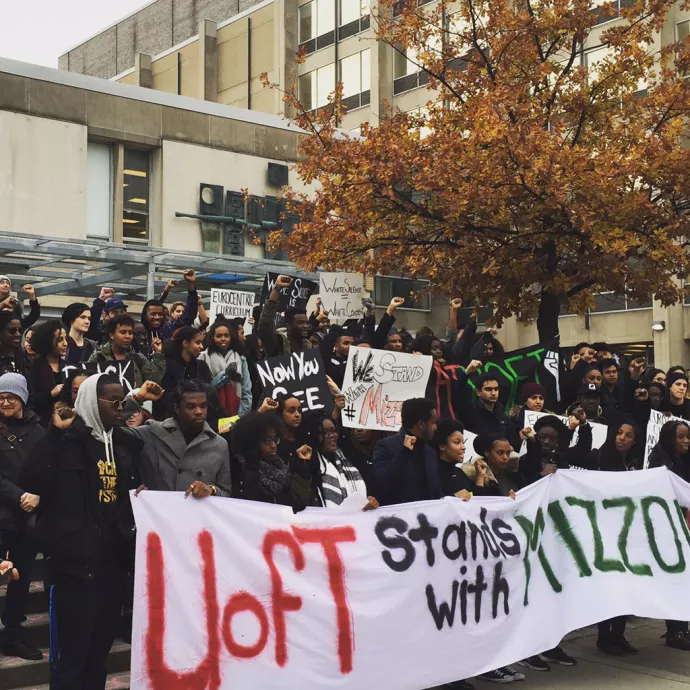
By the numbers: Over $3.4M in SSHRC funding coming to UTM researchers

“With this project, our goal is to identify and understand patterns in campus protest movements and university responses in Canada and the U.S. from 2012 to 2018,” says Berrey.
“Our focus on anti-racism student activism is taking on particular significance right now, given the uprisings against anti-Black and anti-Indigenous police violence that have transpired around the globe over the summer. Our study also is examining protests on a wide range of higher education issues, as well as responses to these protests by university administrations and campus police."
Berrey’s four-year project, which she is undertaking with collaborator Dr. Alex Hanna, formerly a faculty member with UTM’s Institute of Communication, Culture, Information and Technology, now a research scientist with Google, will produce an innovative dataset based on student newspaper reporting on higher education protests.
“We are building the dataset by using a machine-learning system that Dr. Hanna created together with hand-coding by research assistants,” says Berrey.
“We will merge the completed dataset with five existing datasets so we can understand these protests and administrative responses in relation to universities’ organizational characteristics, off-campus Black Lives Matter protest, and other factors. Then we will conduct event history analysis that incorporates spatial proximity measures. As a complement to those analyses, we will conduct qualitative content analysis of activists’ and administrators’ political claims, to explain how each side understands the issues at hand.”
“One of the most exciting parts of the project is the stellar team of University of Toronto students who have contributed to the project. We are entering this fall with a team of 16 research assistants, most of them UTM undergraduate students, who are making the data collection possible.”
“These data will provide a comprehensive overview of the locations, diversity, and diffusion of student protest and patterns in administrations’ reactions in the Black Lives Matter and early Trump eras. Ultimately, they will help us to better understand the determinants and spread of social movements as well as their dynamic interactions with the organizations they target. Then comes the really hard work—translating these insights to support student organizing and to help realize activists' visions for more anti-racist, socially just, ecologically sustainable universities.”
Along with Berrey, the other IG recipients at UTM listed as Principal Investigators (PI) include the following:
Department of Economics
- Rahul Deb for his project, “Explaining and Predicting Committee Voting;”
- Robert McMillan for his project, “Uncovering the Education Production Function;”
- Xianwen Shi for his project, “Information Structure and Market Performance;”
- Xiodong Zhu for his project, “Migration, Growth, and Inequality: Micro Data and Macro Evaluations;”
Department of English & Drama
- Daniel Wright for his project, “The Grounds of the Novel;”
Department of Historical Studies
- Elspeth Brown for her project, “The LGBTQ+ Oral History Digital Collaboratory: 2.0;”
Department of Language Studies
- Adrien Rannaud for his project, “Presse et culture de la célébrité au Québec (1930-1972);”
Department of Management
- Feng Chen for his project, “CEOs' Legal Expertise and Strategic Disclosures of Litigation Loss Contingencies;”
- Dushyant Vyas for his project, “Information Quality and Corporate Restructurings;”
Department of Philosophy
- Nathan Charlow for his project, “Non-Truth-Conditional Content;”
- Jonathan Weisberg for his project, “Centrality & Belief;”
Department of Political Science
- Steven Bernstein for his project, “Coherence and Incoherence in Global Sustainable Development Governance;”
Department of Psychology
- Emily Impett for her project, “Avoiding Pain or Approaching Connection: Navigating Sexual Rejection in Romantic Relationships;”
- Doug VanderLaan for his project, “Gender Development Across Cultures: Understanding and Reducing Children’s Gender Stereotyping and Biases;”
Department of Sociology
- Anna Korteweg for her project, “Border, Boundaries, and Bodies in the Production of Non-Belonging: Regulating the Return of European Women who Joined the Islamic State;”
- Andrew Miles for his project “Is Doing Good Intentional? The Cognitive Foundations of Moral Action.”
Additionally, the following 12 researchers were awarded SSHRC Insight Development Grants from the February 2020 competition:
Department of Anthropology
- Sarah Hillewaert for her project, “Brokering Development: Yoga, Wellness, and East Africa’s Newest Humanitarians;”
- Andrea Muehlebach for her project, “Tracking the Dynamic Cartography of Water Bottling and Contestation in North America;”
Department of Economics
- Mons Chan for his project, “Estimating Productivity for Multi-Product Firms in Imperfect Markets;”
Department of Language Studies
- Derek Denis for his project, “Multicultural Toronto English: Identity and Ideologies;”
Department of Management
- Feng Chen for his project, “Cultural Imprinting, Top Executives’ College Experience, and Corporate Outcomes;”
- Marius Zoican for his project, “Technology and Information Supply in Modern Financial Markets;”
Department of Political Science
- Shivaji Mukherjee for his project, “State Motivations and Civil War Duration – Explaining Sub-national Variation in Counter Insurgency in India;”
- Emily Nacol for her project, “Reimagining Labour: The Politics of Risk and Blame in Early Modern Britain;”
Department of Psychology
- Loren Martin for his project, “Multidimensional Conceptualization of Empathy: Trade-off Between Empathy, Cognitive Load and Motivation;”
Department of Sociology
- David Pettinicchio for his project, “Inclusion and Diversity in Cultural Productions of Disability: Pushing the Boundaries of Aesthetic Citizenship;”
Department of Visual Studies
- Evonne Levy for her project, “The Technical Study of Bernini’s Bronzes: Art History, Conservation, and Material Science;”
Institute of Communication, Culture, Information and Technology
- Julie Chen for her project, “Data-driven AI and the future of work.”
UTM’s Vice-Principal, Research, Professor Kent Moore, is inspired by the generous support of UTM’s social sciences and humanities research community.
“This is such great news for our faculty members and a tremendous showcase of the breadth of research taking place on the UTM campus,” says Moore.
“With some of the obstacles that has overwhelmed the research community in recent months as a result of the pandemic, having the opportunity to pursue activities that are crucial for their work is a true lifeline. These funds not only allow our researchers to support undergraduate and graduate students in these projects, but it ultimately fosters the creation of new knowledge which is a benefit for everyone in academia and beyond. I extend my congratulations to all our recipients for the 2019-20 competitions.”
SSHRC’s granting programs run annually and support research excellence in the social sciences and humanities. It was announced in July 2020 that SSHRC awarded $91 million in funding in the Insight Grant program to more than 1,253 researchers from 60 different Canadian institutions.
For the Insight Development Grants competition, in August 2020 SSHRC announced that they awarded over $32 million to more than 1,045 researchers from 69 Canadian institutions.
See SSHRC’s site or a full list of all SSHRC Insight Grant recipients and Insight Development Grant recipients.
